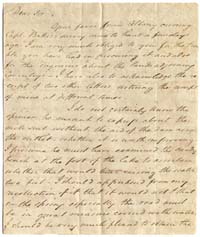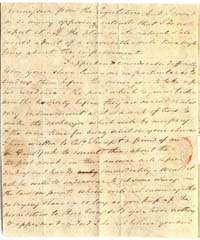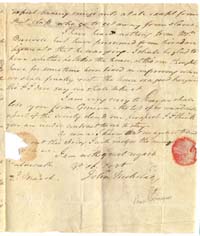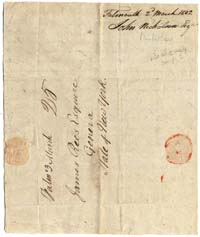John Nicholas letter to James Rees (March 2, 1802)
CWF Rockefeller Library, Special Collections - SCMS2008.7
John Nicholas, Falmouth, VA, letter to James Rees, Geneva, NY. In this letter, Nicholas discusses his impending move to Geneva. He mentions the receipt of a survey done by Capt. Baker and his concerns of the possibility of flooding at the mill site. Nicholas desires to send his slaves to New York before his own departure, but is prevented by the laws of that state. Nicholas suggests to Rees that the law should be changed.
John Nicholas was born in Williamsburg, Virginia. He was the son of Robert Carter Nicholas, brother of Wilson Cary Nicholas, governor of Virginia, and George Nicholas, attorney-general of Kentucky. A lawyer by training, Nicholas was elected to Congress as a Republican in 1793, serving Virginia until 1801. In 1803, he moved to Geneva, New York. Nicholas was elected to the state senate in 1806 and served for three years. He served as judge of the court of common pleas of Ontario, New York until his death in Geneva in 1819.

Dear Sir,
Your favor from Albany covering
Capt. Baker's survey came to hand a few days
ago. I am very much obliged to you for the trou
ble you have had in procuring it and also
for the inquiries about the land adjoining
Coventry's. I have also to acknowledge the re
ceipt of two other letters noticing the receipt
of mine at different times.
I do not certainly know the
opinion he meant to express about the
mill seat without the aid of the dam across
the outlet—whether it is worth improving.
I presume he must have examined the sandy
beach at the foot of the lake to ascertain
whether that would bear raising the water
two feet. I should apprehend from my
recollection of it that it would not & that
in the spring especially the road must
be in great measure covered with water.
I should be very much pleased to obtain the
 permission from the legislature, but I count
permission from the legislature, but I count
on so many opposing interests that I do not
expect it. If the place in it's natural state
would admit of a serviceable mill time might
bring about the improvement.
I apprehend considerable difficulty
from your slave laws—one in particular as to
sending them before the owner goes to take up
his residence—the part which requires twelve
months property before they are carried is also
very inconvenient as it is a work of time to
make the exchanges which will be necessary
& the more time for being select in your choices.
I have written to Colo. [Treap] & a friend of mi[ne]
in New York to consult them about the [tear]
the first point. on their answer will depend
sending out hands [illegible] immediately. Would it
not be well to endeavour to get some change in
the law in points which will not encourage the
carrying slaves—so long as you keep up the
prohibition to their being sold you have nothing
to apprehend—indeed I do not believe you need
 expect many emigrants at all except from
expect many emigrants at all except from
that class who go to get away from slaves.
I have heard nothing from Mr.
[Barwell] but have presumed from his adver
tizements that he was going. I shall be glad to
hear whether he takes the house, as tho' our thoughts
have for sometime been fixed on improving where
we shall finally rest. The house is a good bargain
tho' & I dare say we shall take it.
I am very sorry to hear we shall
lose you from Geneva. The lots of so considerable
a part of the society clouds our prospect & I think
you are under contract to us to stay.
As soon as I know that we are not to send
[tear] out this spring I will inclose the money
[tear] for us.
I am with great regard
Yr. ob. Svrt.
John Nicholas
Falmouth2d March.
